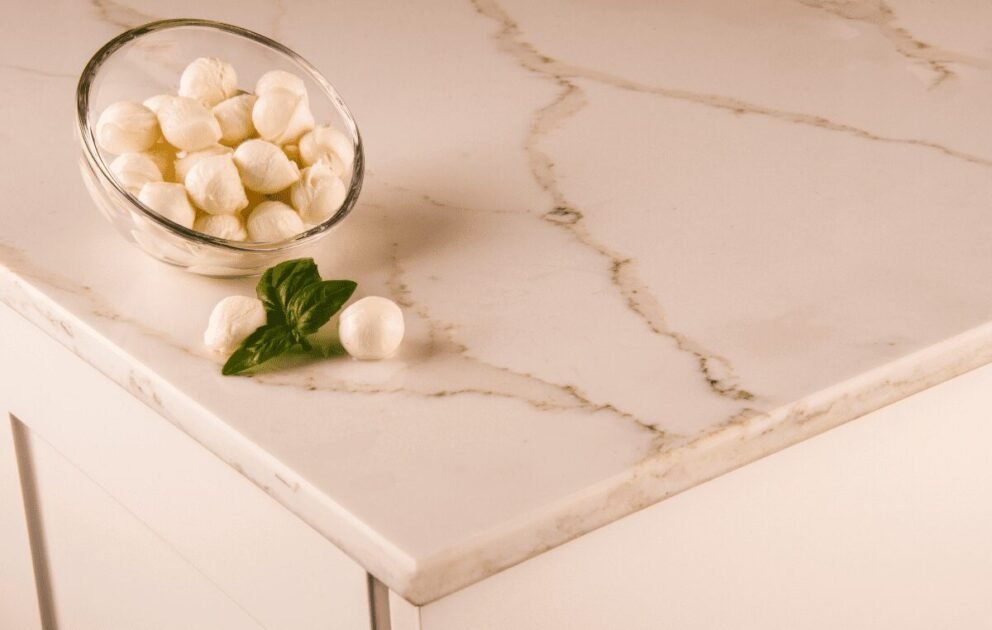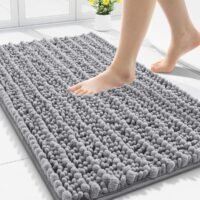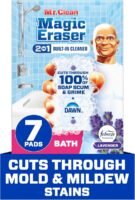Sintered stone is a durable, high-quality countertop material manufactured by compressing minerals and resins at high temperatures. Due to its moisture and stain-resistant properties, it is commonly used for kitchen countertops, vanity tops, sinks, and other surfaces.
The cost of Sintered_stone can vary depending on vendor, thickness, and design factors. Still, it is generally more expensive than laminate and wood countertops and less expensive than natural stones like granite and marble. It is essential to consider that sintered stone can crack under pressure if not properly leveled, and repairs can be complex and costly.
Overall, sintered stone offers a cost-effective and long-lasting option for achieving a stunning and durable kitchen or bathroom surface.
:max_bytes(150000):strip_icc()/KitchenCountertop-f41f40595db34ff48b15509256ec779f.jpg)
Durable And Moisture-resistant Surfaces: Sintered Stone For Kitchen Worktops And Sinks
Sintered_stone is a versatile and popular material known for its durability and moisture-resistant properties. It is an excellent choice for kitchen worktops and sinks, providing long-lasting and attractive surfaces that can withstand the demands of daily use.
High Durability Against Moisture And Stains
One of the critical advantages of sintered stone is its remarkable durability, especially regarding moisture and stains. Unlike natural stone countertops, Sintered_stone doesn’t require sealing to protect against water damage, making it highly resistant to moisture and humidity in the kitchen environment. This makes it ideal for areas prone to water splashes, such as around the sink or near the stovetop.
Sintered_stone also offers excellent stain resistance, ensuring that your kitchen worktops and sinks stay clean and pristine for years. Its non-porous surface repels liquids and prevents any absorption that could lead to stains or discoloration. This makes it an excellent choice for busy kitchens where spills are likely.
Ideal For Kitchen Countertops And Sinks
Sintered_stone is specifically designed to handle the high demands of kitchen countertops and sinks. Its durable nature makes it resistant to scratching, chipping, and heat, allowing you to place hot pots and pans directly on the surface without worrying about causing damage. This makes it a practical choice for those who love to cook and entertain in their kitchen.
Additionally, Sintered_stone offers a wide range of colors and finishes, allowing you to customize your kitchen according to your style. Whether you prefer a minimalist and sleek look or a more traditional and rustic vibe, sintered stone can achieve the desired aesthetic for your kitchen worktops and sinks.
Versatility In Office Countertops And Vanity Tops
While sintered_stone is commonly used in kitchen environments, its versatility extends beyond residential spaces. It is also an excellent choice for office countertops and vanity tops due to its durability and aesthetic appeal. In an office setting, sintered_stone can withstand the demands of daily use while adding a touch of elegance to the workspace.
Similarly, in bathrooms, Sintered_stone can be used for vanity tops, providing a durable and water-resistant surface that can withstand the humid conditions of the space. Its non-porous nature ensures it remains hygienic and easy to clean, making it an ideal choice for these high-moisture areas.
Overall, Sintered_stone offers a combination of durability, moisture resistance, and aesthetic versatility, making it an excellent choice for kitchen worktops, sinks, office countertops, and vanity tops. Its ability to withstand the demands of daily use while maintaining its visual appeal makes it a long-lasting investment for residential and commercial spaces.
Comparing The Cost: Sintered Stone Vs. Natural Stone And Other Options
Sintered_stone offers a cost-effective alternative to natural stone for countertops and other surfaces. It is cheaper than natural stone yet still durable and long-lasting. Consider sintered_stone for a budget-friendly option without compromising on aesthetics.
Factors Influencing The Cost: Vendor, Thickness, Etc.
When considering the cost of sintered_stone, it is essential to consider various factors influencing the price. These factors include the vendor you choose, the thickness of the stone, and any additional customization or features you may desire.
Each vendor may have different pricing structures and overhead costs, which can impact the overall cost of the sintered_stone. Doing thorough research and obtaining multiple quotes is essential to ensure you are getting the best value for your money.
Additionally, the thickness of the Sintered_stone can also affect the price. Thicker slabs may be more expensive due to the increased material and precision needed during manufacturing processes.
Comparing Sintered Stone To Natural Stone (Granite, Marble)
When comparing the cost betweensintered_stone and natural stone options such as granite or marble, sintered_stone generally offers a more cost-effective solution without compromising quality or aesthetics.
Natural stone, such as granite or marble, is often at the higher end of the price spectrum due to its limited availability and the need for extraction and processing. Sintered_stone, on the other hand, Sintered_stone is manufactured using a combination of minerals and resins, which are typically more cost-efficient than natural materials.
Furthermore, Sintered_stone can provide consistent color and pattern options, reducing the need to search for unique or high-end stone variants. This can contribute to additional cost savings as well.
Cost-effectiveness Of Sintered Stone Compared To Other Materials
Regarding cost-effectiveness, Sintered_stone is an excellent choice compared to other materials commonly used for countertops and surfaces.
Compared to natural stone, sintered_stoneoffers a more budget-friendly alternative while maintaining durability and aesthetic appeal. It falls between the price range of laminate and wood countertops (the cheapest) and natural stones like granite and marble (the most expensive).
Additionally, Sintered_stone can be more cost-effective than other options, such as quartz. While quartz is known for its durability, sintered_stone can offer similar qualities at a lower price point. It’s essential to weigh each material’s benefits and costs before deciding.
Versatile Applications Of Sintered Stone In Different Settings
Residential Spaces: Kitchen Countertops, Bathroom Vanity Tops
Sintered_stone offers many applications in residential spaces, such as kitchen countertops and bathroom vanity tops. This high-end material provides a durable, moisture-resistant, and stain-resistant surface that is perfect for these standard areas in the home.
Whether preparing meals in the kitchen or getting ready in the bathroom, sintered_stone countertops and vanity tops offer functionality and style. With its sleek and modern appearance, sintered_stone can instantly elevate the aesthetic of any residential space.

Commercial Spaces: Office Countertops, Retail Displays, Etc.
In commercial settings, Sintered_stone proves to be a versatile choice due to its durability and aesthetic appeal. For office spaces, sintered_stone countertops can withstand heavy daily use and provide a professional and sophisticated look. Retail displays can also benefit from using sintered stone, as it can enhance the visual impact of products and create an inviting atmosphere for customers. With its wide range of colors and patterns, sintered_stone can be customized to match the branding and style of any commercial space.
The Advantages And Considerations Of Sintered Stone
Sintered_stone is a cost-effective and durable material commonly used for kitchen, vanity, and office countertops. It is cheaper than natural stone but offers excellent aesthetic appeal and longevity. However, it can be more expensive than quartz due to its complex manufacturing process and the high-quality materials.
Considerations should be made for leveling and repairs to ensure its durability.
Benefits And Advantages Of Sintered Stone
Sintered_stone offers a range of benefits and advantages that make it an increasingly popular choice for countertops and other surfaces. Here are some key advantages of using sintered_stone:
1. Durability and resilience: sintered_stone is known for its exceptional strength and resistance to impacts, scratches, and heat. It is highly durable and can withstand heavy use and daily wear and tear without losing its aesthetic appeal.
2. Stain and chemical resistance: sintered_stone is non-porous and does not absorb liquids. This makes it highly resistant to stains and chemicals found in certain household products. It also prevents the growth of bacteria and mold, making it a hygienic option for kitchens and bathrooms.
3. Design versatility: Sintered_stone is available in various colors, patterns, and finishes, allowing endless design possibilities. Whether you prefer a sleek and modern look or a natural and rustic aesthetic, a sintered_stone option suits your style.
4. Low maintenance: sintered_stone requires minimal maintenance, as it is easy to clean and does not require sealing or polishing. Regular cleaning with mild soap and water is usually sufficient to keep it looking brand new. 5. Environmental sustainability: sintered_stoneis an eco-friendly choice, made from natural materials and is recyclable. Its production process also uses less water and energy than other countertop materials.
Potential Downsides And Considerations
While sintered_stone offers numerous advantages, it is essential to consider some potential downsides and factors before deciding. Here are a few considerations: 1. Cost: Sintered_stone is generally more expensive than other countertop materials, such as laminate or quartz. The cost can vary depending on the brand, thickness, and additional customization options. It is essential to factor in the budget when considering sintered_stone for your project.
2. Professional installation: sintered_stone countertops require professional installation due to their weight and complexity. Improper installation can lead to cracking or other issues, so it is recommended to hire experienced installers to ensure proper leveling and support.
3. Limited availability: While sintered_stone is growing in popularity, it may not be as readily available as other countertop materials. It is essential to check with local suppliers or distributors to ensure availability and access to various options.
4. Repairs: In the unlikely event that sintered_stone does get damaged, repairs can be complex and costly. Due to the precise cutting required for each project, repairs can be inconvenient and may require replacing the entire slab. Overall, sintered_stone offers numerous advantages in durability, design versatility, and low maintenance. However, it is essential to consider the potential downsides and costs associated with this material before making a final decision for your project.

Frequently Asked Questions On What Is Sintered Stone? Uses, Cost, And Considerations
What Is Sintered Stone Used For?
Sintered stone is used for various applications like kitchen worktops, vanity tops, sinks, office countertops, and dining tables. It is a durable and stain-resistant material that costs less than natural stone but still provides a high-end look. Though repairs can be complex and expensive, the sintered stone is famous for those looking for a stunning and long-lasting option.
Is Sintered Stone Cheaper?
Sintered_stone is not cheap, but it’s not the most expensive either. It falls between laminate and wood (the cheapest) and natural stones like granite and marble (the most expensive). The cost varies based on vendor and thickness. Sintered stone lasts longer than other materials and is a cost-effective option.
What Is The Downside Of Sintered Stone?
The downside of Sintered_stone includes potential cracking if not leveled correctly, complex and expensive repairs, and difficulty in cutting and repairing the material. Additionally, sintered stone can be more expensive than quartz countertops due to its complex manufacturing process and high-quality materials.
Is Sintered Stone More Expensive Than Quartz?
Sintered_stone is generally more expensive than quartz countertops due to its complex manufacturing process and high-quality materials. Quartz countertops are more affordable, varying costs depending on brand, design, and thickness.
Conclusion
Sintered_stone is a versatile and cost-effective material with many advantages compared to other countertop options. It offers durability, resistance to moisture and stains, and a range of design possibilities. While it may come with a higher price tag than some materials, it is still more affordable than natural stone options.
Sintered stone is an excellent choice for kitchen worktops, vanity tops, sinks, and other surface applications. Its unique properties make it popular for those seeking a stunning and long-lasting kitchen or bathroom.

Hi, I’m Esrat, and I’m so glad that you found me here at Happy Food Kitchen! I started Happy Food Kitchen in 2023 to have a creative, right-brained outlet to balance my very left-brained career in genetics.




